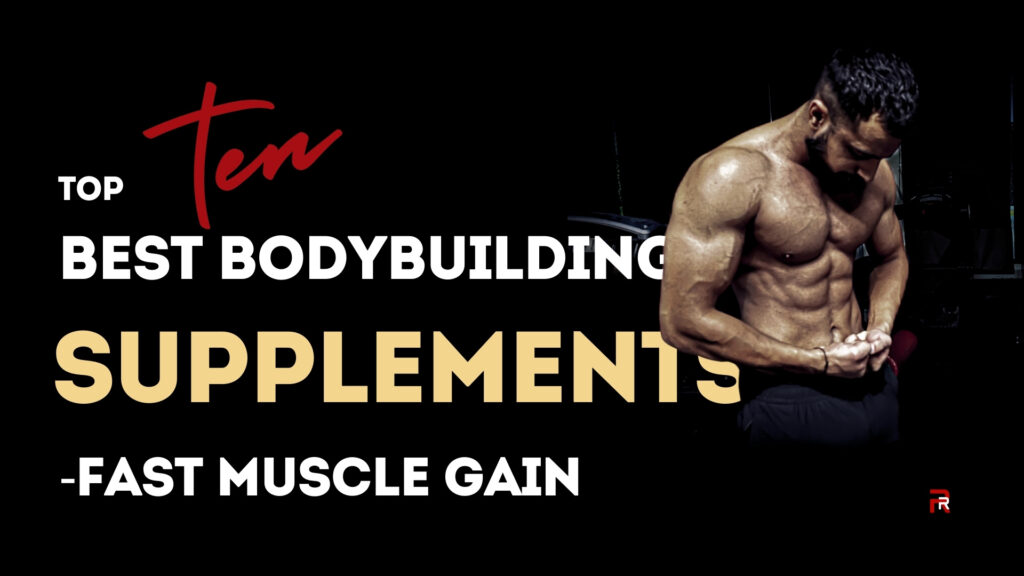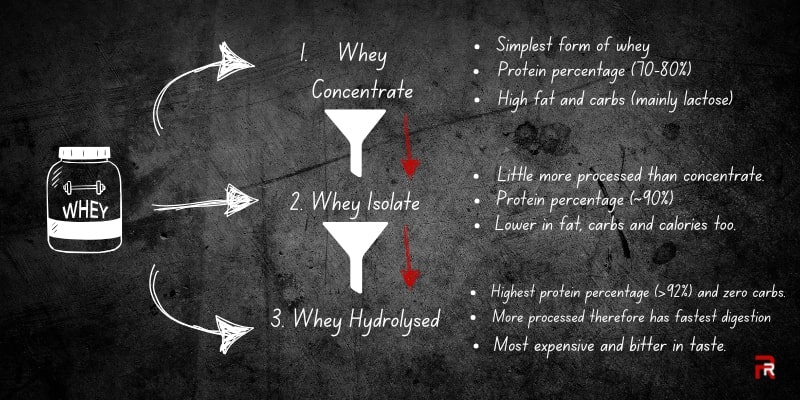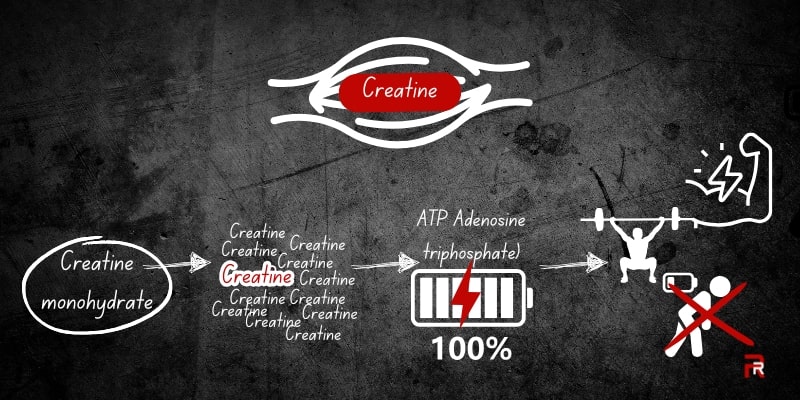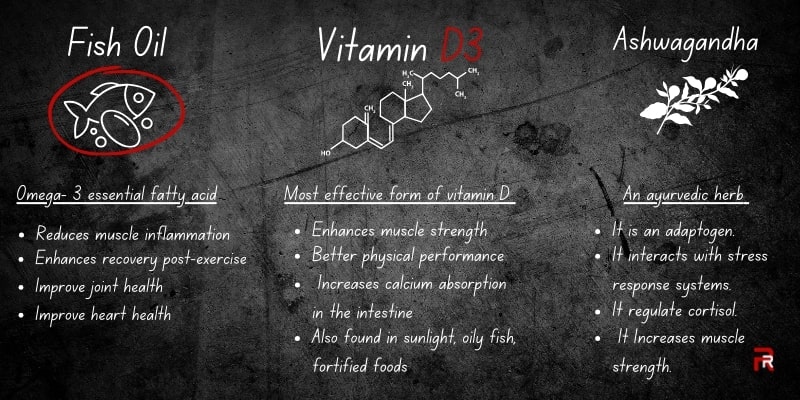Top 10 Best Bodybuilding Supplements- Fast Muscle Growth
Bodybuilding supplements can be overwhelming. One step into the supplement section or an online shop, and you’re flooded with choices, each one shouting about strength and stamina.

As a fitness coach, I get questions from clients all the time, unsure of where to start. So, I’m here to give you a clear-cut guide to the top 10 best bodybuilding supplements that can truly help you build muscle, recover better, and push past plateaus.
We’re cutting straight to what works, how to use it, and what you need to know. Each of these essential supplements for muscle gain and fat loss has a job to do—if you understand their roles, you’ll know how to make the most out of each one.
Best Supplements For Muscle Gain And Fat Loss Are Here :
- Whey Protein
- Creatine Monohydrate
- Beta-Alanine
- Caffeine
- L-Citrulline
- Fish oil
- HMB
- Vitamin D3
- ZMA
- Ashwagandha
Whey Protein
When people think of muscle-building supplements, whey protein usually tops the list, and for good reason. This complete protein has all nine essential amino acids your body can’t make on its own.
According to the Journal of the International Society of Sports Nutrition, Whey enhances muscle protein synthesis, promotes strength and muscle size gain.
Fast-digesting and versatile, whey protein helps kick-start muscle repair right after workouts, supplying muscles with amino acids when needed most.It is the top supplement for muscle recovery
Proteins are the building blocks of muscles, and in spite of muscle building, they help in repairing Muscles, hormone production, transporting nutrients and oxygen, and many other ways.
Whey protein is of 3 types:
- Whey Concentrate: It is the simplest form of whey and it usually comes in different flavors. It is a little lower in protein percentage (70-80%) and higher in the amount of fat and carbs (mainly lactose). Therefore, lactose intolerants should not consume it.
- Whey Isolate: It is a little more processed than concentrate. Therefore, it has a higher protein percentage (~90%) and is lower in fat, carbs and calories too. It is lactose-free and thus recommended for somebody who is lactose intolerant.
- Whey Hydrolyzed: It has the highest protein percentage (>92%) and zero carbs. In terms of digestion, this one is the fastest. But in muscle building, it will not do any sudden magic for you plus it is most expensive and bitter in taste.

Our regular diet does not give us enough protein so everyone should take protein. But the question is how?
How to Take Whey Protein:
One scoop (20-25g protein) post-workout is a good starting point. It is the best post-workout supplement for muscle gain Otherwise you can take whey protein any time to complete daily protein requirements.
If your goal is muscle gain, aim to consume roughly 0.8 to 1.5 grams of protein per pound of body weight daily, with whey protein supplementation helping you hit that target. Also, you can take it with water or milk and even add it to your food according to your taste.
Creatine Monohydrate
If muscles threw a party, whey protein and creatine would be the VIPs on the guest list. Gains guaranteed!
Creatine monohydrate is a classic supplement that’s proven to enhance muscle strength and size. I’ll tell you how? Creatine is a natural substance found in our muscles, which helps in producing ATP (adenosine triphosphate) the energy currency of the body.
This ATP is required for quick movements during exercise.
We do not have sufficient ATP that is why we feel tired. Creatine monohydrate helps by increasing creatine levels in muscles, allowing the body to produce more ATP and enabling muscles to perform longer before fatigue sets in.

According to the American Journal of Clinical Nutrition, creatine improves high-intensity exercise performance and increases muscle mass by fueling your muscles during short, explosive movements, like lifting heavy weights. Thus, it has become one of the top supplements for muscle gain one researcher swears by.
It helps in muscle cell hydration which means the overall body may become dehydrated. Therefore it is an underlined rule of drinking plenty of water if you consume creatine monohydrate.
During workouts, our body experiences a lack of oxygen, in such a type of respiration a by-product named lactic acid is produced in our muscles which causes pain in muscles. At this point, creatine helps in buffering the lactic acid buildup which means you can exercise a little longer.
Creatine also inhibits the production of Myostatin which is a protein that limits muscle growth in humans, thus helping you break plateaus.
How To Take Creatine Monohydrate:
A 3-5 gram daily dose is enough. Creatine isn’t a “take it once and see instant results” deal. It needs time to saturate and that requires maintenance, that is why some might load Creatine 10-15 grams for the first few days and then 3-5 grams for maintaining saturation levels. Although it’s not necessary to load Creatine.
Beta-Alanine
Okay, we just talked about lactic acid, remember? We know that it is the result of anaerobic respiration, and it limits our performance during workout.
This is how it allows us to continue exercising a little bit longer.
Carnosine also helps with mental focus and cognitive function as it is also used in the treatment of Autism in children.
Now you must be thinking what is the role of beta- alanine then?
Well, carnosine is made up of two amino acids, beta-alanine and histidine.
Beta-alanine is an amino acid that combines with histidine in our body to make carnosine after digestion. It is an active ingredient in pre-workout drinks and is responsible for the tingling sensation in the neck and ears.
How to Take Beta-Alanine:
2-5 grams daily, ideally split into smaller doses. Expect some tingling—it’s harmless but can catch you off guard if you’re new to beta-alanine.
Caffeine
Who says caffeine is just for waking up? It’s here to turn you into a gym superhero, minus the cape!
Medicine & Science in Sports & Exercise have shown that caffeine can improve endurance, cognitive function and even increase the number of reps you can complete. Plus, it’s a solid way to mentally power through a tough session.
It is a natural workout supplement that quickly enters the bloodstream and travels to the brain, blocking adenosine (a chemical that induces sleepiness) and helping you stay alert and focused.
You can take it as black coffee (but be conscious of the amount, do not overdo it), or it is already present in pre-workout drinks.
How to Take caffeine:
3-6 mg per kilogram of body weight, take 30-60 minutes before exercise. Be cautious about timing—caffeine can disrupt sleep if you take it too late.
L-Citrulline
L-Citrulline is a favorite among those looking for muscle pumps. It is a fitness supplement that increases nitric oxide in the blood, helping expand blood vessels, which enhances blood flow to muscles.
This means better nutrient delivery during workouts, more endurance, and, yes, bigger pumps that help you look and feel stronger.
How To Take L-Citrulline:
Taking 3-6 grams 30-60 minutes before a workout can reduce muscle soreness and improve performance. Look for L-citrulline over citrulline malate for the best results.
Fish oil
Fish oil on a muscle-building list? Yes,it is a natural bodybuilding supplement and here’s why.
There are two essential fatty acids: Linoleic acid, or “omega-6 essential fatty acid”, and alpha-linolenic acid (ALA), or simply “omega-3 essential fatty acid.” These ALA convert into long-chain polyunsaturated fatty acids EPA, which further changes to DHA. Both EPA and DHA are present in oily fish like salmon, mackerel, sardines, etc.
There are many benefits of fish oil capsules for the gym. Fish oil helps reduce inflammation and improve joint health, which is crucial for anyone lifting weights regularly.
EPA and DHA look after our muscles as we get older. According to the European Journal of Clinical Nutrition, it reduces muscle inflammation and enhances recovery post-exercise and overall heart health, making it a smart addition to any fitness regimen.
How To Take Fish Oil:
Aim for 1-3 grams of fish oil (EPA and DHA) daily.
You might not need a supplement if you eat a lot of oily fish, but it’s helpful if fish isn’t often on the menu.
Whether you go to the gym or not, whatever age group you belong to, omega-3 is crucial for you. If you are vegan or vegetarian, you can also try algal oil or flaxseed oil capsules.
HMB (Beta-Hydroxy Beta-Methyl Butyrate)
Whenever we consume protein, we get leucine, an essential amino acid. Some of this leucine breaks into HMB but in tiny amounts.
HMB is a lesser-known supplement but a powerful one for muscle preservation for beginners.
This muscle gain supplement is for beginners. It helps increase muscle strength, improve recovery, and maintain muscle mass. This can also be beneficial for people returning to the gym after a break. However, it is not that beneficial for intermediate and expert-level gym goers.
How Much To Take:
Around 3 grams daily, ideally split into smaller doses.
Vitamin D3
Cholecalciferol, or vitamin D3, whatever you want to call it, is the most effective form of vitamin D (or sunshine vitamin) for boosting and maintaining vitamin D levels in the body.
The primary source of vitamin D3 is sunlight, oily fish, fortified foods, and supplements.
Today, vitamin D deficiency is very common. You often hear about vitamin D being essential for bone health, muscle functioning, immunity, etc., but how?
Vitamin D3 works as a team with vitamin K2; both are essential fat-soluble vitamins. D3 increases calcium absorption in the intestine from where it enters the bloodstream, while K2 directs calcium where to go (like bone and teeth) and where not to go (like arteries).
According to the American Journal of Clinical Nutrition, vitamin D3 enhances muscle strength and improves physical performance, especially in vitamin D deficient individuals.
How Much to Take:
Most supplements contain D3 and K2 together. Most adults should take 600-800 IU (15-20 mcg) daily. They should consult a doctor for more guidance.
ZMA
ZMA stands for Zinc Magnesium Aspartate. It combines essential minerals and vitamins: zinc, magnesium, and vitamin B6 which makes it a good muscle supplement.
It is the best pre-bed supplement.
Nutrition & Metabolism suggests that ZMA may improve testosterone levels and support strength gains in individuals with zinc or magnesium deficiency, but effects in non-deficient individuals are less pronounced.
ZMA provides your body with critical nutrients that may be lost during exercise or through dietary insufficiencies. Zinc and magnesium are essential for many bodily functions, including supporting the immune system, enhancing muscle recovery after workouts, and regulating hormones like testosterone, which is important for muscle growth.
How To Take ZMA:
Follow label recommendations, usually 30 mg of zinc, 450 mg of magnesium, and 10.5 mg of vitamin B6. Taking ZMA before bed can also enhance sleep quality aiding in a better recovery.
Ashwagandha
Ashwagandha is an ayurvedic herb that is an adaptogen. This means it helps the body adapt to stress and maintain balance by interacting with its stress response systems, including the hypothalamic-pituitary-adrenal (HPA) axis, to regulate cortisol and other stress hormones.
Stress hormones like cortisol interfere with muscle recovery and growth.
Studies show that too much cortisol raises blood sugar (glucose) levels to provide quick energy for muscles and the brain. Therefore, it causes weight gain (especially around the abdomen), high blood pressure, insomnia, irritability, and frequent infections. High Cortisol levels might also result in a decrease in testosterone levels.
Conversely, lower cortisol levels cause fatigue, muscle weakness, low blood pressure, and weight loss.
Ashwagandha keeps cortisol balanced and is an ayurvedic supplements for bodybuilding.
According to the Journal of the International Society of Sports Nutrition, it Increases muscle strength, reduces exercise-induced damage, and improves recovery.

How Much To Take:
300-500 mg daily, usually standardized to 5% withanolides (polyoxygenated steroidal lactones that contribute to anti-inflammatory effects) for the best effects. Ashwagandha works subtly over time, so patience is key.
Tips to Use These supplements for muscle gain and strength Right:
- Timing Matters: Each supplement has a unique timing window. Protein and amino acids perform best around your workout. Others, like fish oil or ZMA, work better with meals or at bedtime as these are muscle builder food supplements.
- Quality Over Quantity: More isn’t always better. For example, creatine works fine in small doses once your muscles are saturated, so save yourself some cash by sticking to maintenance dosing.
- Listen to Your Body: Some people are sensitive to caffeine or beta-alanine. You can always start with the lowest recommended dose and see how you feel.
Each supplement for muscle growth on this list has been tried and tested, with actual results backing them up. They’re not magic pills, but when paired with consistent training and a solid diet, they can make a noticeable difference in your progress. You can find the Best Fat-burning workouts in our previous article.
Remember, supplements support your hard work, not replace it. Stay consistent, know your body, and make sure your supplements work for you, not against you.
Getting the most out of your supplement stack is like cooking—it’s about finding the right combination and not overdoing it on any one ingredient.
